Related Research Articles
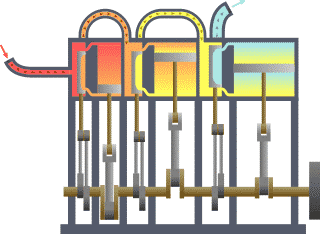
A compound steam engine unit is a type of steam engine where steam is expanded in two or more stages. A typical arrangement for a compound engine is that the steam is first expanded in a high-pressure (HP) cylinder, then having given up heat and losing pressure, it exhausts directly into one or more larger-volume low-pressure (LP) cylinders. Multiple-expansion engines employ additional cylinders, of progressively lower pressure, to extract further energy from the steam.

Regent Mill, Failsworth is a Grade II listed former cotton spinning mill in Failsworth, Oldham, Greater Manchester, England. It was built by the Regent Mill Co Ltd. in 1905, and purchased by the Lancashire Cotton Corporation in 1930. It was taken over by the Courtaulds Group in 1964. On ceasing textile production it was occupied by Pifco Ltd, and then by Salton Europe Ltd who now occupy this site. It was driven by an 1800 hp twin tandem compound engine by Buckley & Taylor. It became a ring mill with 60,000 spindles in 1915, all provided by Platt Brothers.

The Maple Mill was a cotton spinning mill in Hathershaw, Oldham, Greater Manchester, England. It was designed as a double mill by the architect Sydney Stott. The first mill was built in 1904 and the second mill in 1915. In 1968, it was equipped with the first open-end spinning machines in England. When spinning ceased in the 1990s, it was bought by Vance Miller. Trading Standards raided the mill in 2006, and ordered Mr Miller stop selling products that failed national safety provisions. Maple Mill No. 2 was the first mill to be partially destroyed by a fire on April 21, 2009. The fire brigade was in attendance for two weeks and deployed 34 appliances. Later on in 2016, Maple Mill No. 1 was damaged by fire on September 30. On 15 December 2016 a major incident was declared when the same mill became fully ablaze. The land of the two mills has now been cleared fully since 2021, including its chimney, and the site is now going to be housing.
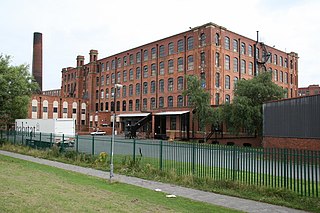
Buckley & Taylor was a British engineering company that manufactured stationary steam engines. It was the largest firm of engine makers in Oldham, Lancashire, England. The company produced large steam-driven engines for textile mills in Oldham and exported to India, Holland and Brazil.
Magnet Mill, Chadderton is a cotton spinning mill in Chadderton, Oldham, Greater Manchester. It was built by the Magnet Mill Ltd. in 1902, but purchased by the Lancashire Cotton Corporation in 1935. It was later taken over by the Courtaulds Group. Ceasing textile production in December 1966, it was demolished soon after. A suburban residential estate now occupies this site. It was driven by a 2200 hp twin tandem compound engine by George Saxon & Co, Openshaw, 1903. It had a 27-foot flywheel with 35 ropes, operating at 64½ rpm.

Ace Mill is a cotton spinning mill in Chadderton in the Metropolitan Borough of Oldham, Greater Manchester. It was built as Gorse No. 2 Mill, in 1914 and cotton was first spun in 1919 by the Ace Mill Ltd, who renamed the mill. It was taken over by the Lancashire Cotton Corporation in the 1930s and passed to Courtaulds in 1964. Production ended in 1967.

Fox Mill, Hollinwood is a cotton spinning mill in Hollinwood, Oldham, Greater Manchester. It was taken over by the Lancashire Cotton Corporation in the 1930s and passed to Courtaulds in 1964.

Royton Ring Mill was a cotton mill in Royton, Greater Manchester, England. It was built in 1908 and extended in 1912. It was taken over by the Lancashire Cotton Corporation in 1935 and passed to Courtaulds in 1964. Production finished in 1966. It was extended again in 1969 and used for other purposes. It has now been demolished, the street has been renamed and houses replace it.
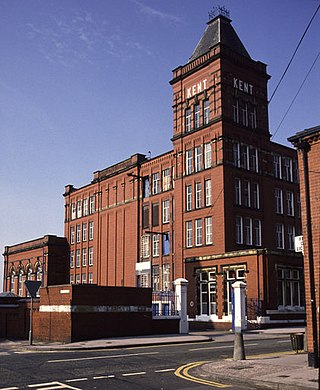
Kent Mill, Chadderton was a cotton spinning mill in Chadderton, Oldham, Greater Manchester. It was built in 1908 for the Kent Mill Co. It was taken over by the Lancashire Cotton Corporation in 1938 and passed to Courtaulds in 1964. Production finished in 1991 and it was demolished in 1994.

Manor Mill, Chadderton is an early twentieth century, five storey cotton spinning mill in Chadderton, Oldham, Greater Manchester. It was built in 1906. It was taken over by the Lancashire Cotton Corporation in the 1930s and passed to Courtaulds in 1964. Production finished in 1990.

Royd Mill, Oldham was a cotton spinning mill in Hollinwood, Oldham, Greater Manchester, England. It was built in 1907, and extended in 1912 and 1924. It was taken over by the Lancashire Cotton Corporation in the 1930s and passed to Courtaulds in 1964. Production finished in 1981. The mill was demolished in 2015 to make way for a "DifRent" housing scheme.
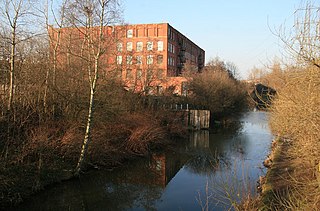
Malta Mill, Middleton is a former cotton spinning mill in the Mills Hill area of Chadderton, Greater Manchester. It lies alongside the Rochdale Canal. It was built in 1904 as a new mule mill, by F. W. Dixon The engine stopped in 1963. The building still stands.

Mars Mill was a former cotton spinning mill in Castleton, Rochdale, Greater Manchester, England. Castleton joined the Borough of Rochdale in 1899. Queensway, Castleton was a hub of cotton mills; Mars, Marland, and Castleton Mill were a group of three. It was taken over by the Lancashire Cotton Corporation in 1935 and passed to Courtaulds in 1964 and demolished in the 1990s; Marland survived until 2004.

Carels Frères, or Carels Brothers, was a manufacturer of stationary steam engines in Ghent, Belgium. For instance, in 1909, they supplied a 1200 hp tandem compound engine with super heater to Moston Mill, a cotton mill in Moston, North Manchester. It was their works no 875, with cylinders 30 and 53 in bore with a 3 ft 11+1⁄4 in (1,200 mm) stroke. Developing 1,200 hp (890 kW) at 90 rpm, superheated steam 200 psi (1,379 kPa) was supplied by Tetlow boilers. The flywheel, 19 ft (5,791 mm) in diameter, was provided with the sixty rope grooves that the full power would have required. The second half of the mill, however, was never completed, and in 1958 electric drives were installed, and the engine was scrapped.
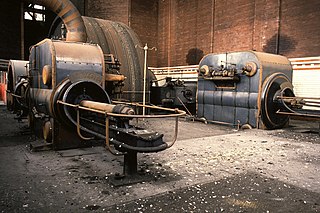
Yates & Thom Ltd, or Yates of Blackburn, was a British manufacturer of stationary steam engines and boilers at the Canal Ironworks, Blackburn, Lancashire, England.
Alexander Petrie and Co was a company that manufactured stationary steam engines. It was based in Rochdale, Greater Manchester in England. The company did general millwrighting, producing some steam engines during the 19th century. Around 1845, their superintendent, William McNaught, was producing large steam-driven beam engines for textile mills in Rochdale.
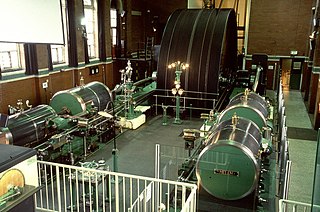
J & E Wood was a company that manufactured stationary steam engines. It was based in the Bolton in Greater Manchester, England. The company produced large steam-driven engines for textile mills in Lancashire and elsewhere.

Ellenroad Mill was a cotton spinning mill in Newhey, a village in the Milnrow area of Rochdale, England. It was built as a mule spinning mill in 1890 by Stott and Sons and extended in 1899. It was destroyed by fire on 19 January 1916. When it was rebuilt, it was designed and equipped as a ring spinning mill.
References
Notes
- 1 2 3 Gurr & Hunt 1998 , p. 15
- ↑ Roberts 1921
- ↑ George Watkins differed in the detail, proposing it was a 1500 hp engine with 21" and 44" cylinders on a 5 ft stroke, that was steamed at 170psi. The 24 ft flywheel drove 34 ropes. George Watkins.
Bibliography
- Gurr, Duncan; Hunt, Julian (1998), The Cotton Mills of Oldham, Oldham Education & Leisure, ISBN 0-902809-46-6
- Roberts, A S (1921), "Arthur Robert's Engine List", Arthur Roberts Black Book., One guy from Barlick-Book Transcription, archived from the original on 2011-07-23, retrieved 2009-01-11
